谷歌发展史英文
- 格式:doc
- 大小:25.50 KB
- 文档页数:2
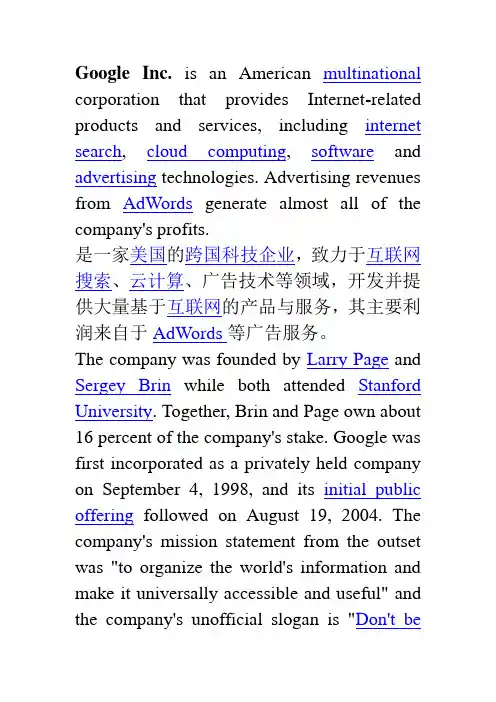
Google Inc.is an American multinational corporation that provides Internet-related products and services, including internet search, cloud computing, software and advertising technologies. Advertising revenues from AdWords generate almost all of the company's profits.The company was founded by Larry Page and Sergey Brin while both attended Stanford University. Together, Brin and Page own about 16 percent of the company's stake. Google was first incorporated as a privately held company on September 4, 1998, and its initial public offering followed on August 19, 2004. The company's mission statement from the outset was "to organize the world's information and make it universally accessible and useful" and the company's unofficial slogan is "Don't beevil".In 2006, the company moved to its headquarters in Mountain View, California.半年启用。
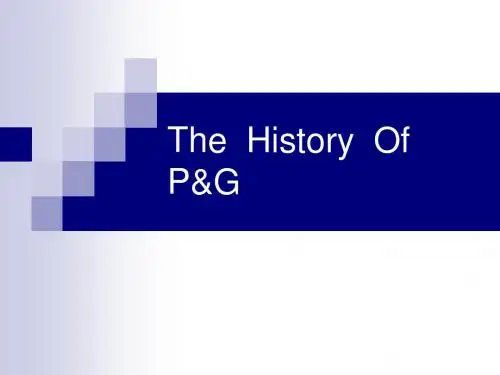
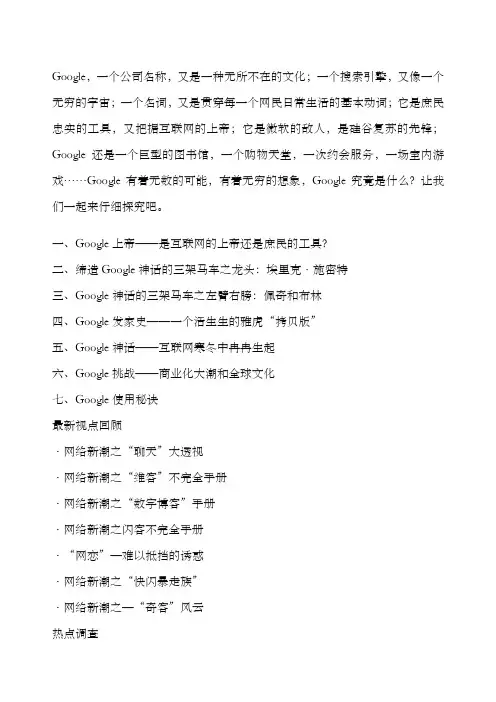
Google,一个公司名称,又是一种无所不在的文化;一个搜索引擎,又像一个无穷的宇宙;一个名词,又是贯穿每一个网民日常生活的基本动词;它是庶民忠实的工具,又把据互联网的上帝;它是微软的敌人,是硅谷复苏的先锋;Google还是一个巨型的图书馆,一个购物天堂,一次约会服务,一场室内游戏……Google有着无数的可能,有着无穷的想象,Google究竟是什么?让我们一起来仔细探究吧。
一、Google上帝——是互联网的上帝还是庶民的工具?二、缔造Google神话的三架马车之龙头:埃里克·施密特三、Google神话的三架马车之左臂右膀:佩奇和布林四、Google发家史——一个活生生的雅虎“拷贝版”五、Google神话——互联网寒冬中冉冉生起六、Google挑战——商业化大潮和全球文化七、Google使用秘诀最新视点回顾·网络新潮之“聊天”大透视·网络新潮之“维客”不完全手册·网络新潮之“数字博客”手册·网络新潮之闪客不完全手册·“网恋”—难以抵挡的诱惑·网络新潮之“快闪暴走族”·网络新潮之—“奇客”风云热点调查GOOGLE会成为网络的微软吗?会不会不知道一、Google上帝——是互联网的上帝还是庶民的工具?互联网是一个江湖,是一个过于热闹的江湖!短短几年之内,不但由热而寒,由盛而衰,由喜而悲,而是物是人非。
江湖盟主不断更换,令人眼花缭乱。
如今,变局之快也没有因为互联网寒冬而放慢节奏.....[全文]2000年Nasdaq崩盘,一时间,江湖黯淡,互联网群龙无首,颓势一片。
但是,正当许多幸灾乐祸的人们准备为互联网行业举行葬礼的时候,一位新的盟主脱颖而出:这就是Google,有中文名称为“狗哥”.....[全文]作为一家纯粹的专业搜索引擎公司,Google的神奇到底为什么?因为,搜索引擎根本不是新鲜事物,90年代中期第一批崛起的网站基本上都是以搜索引擎为方向的,早已经是互联网领域的"传统商业模式"。
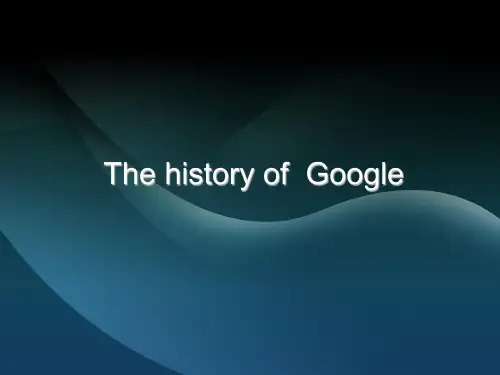
![google发家史[1]](https://uimg.taocdn.com/b48ac3d45022aaea998f0f47.webp)
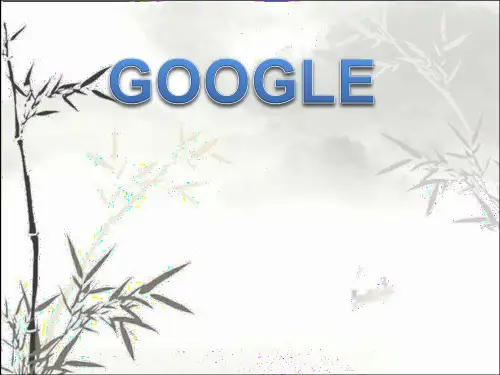
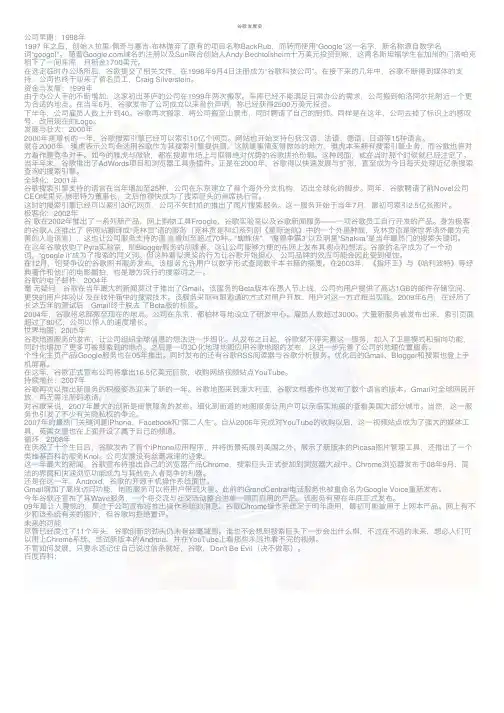
⾕歌发展史公司早期:1998年1997 年之后,创始⼈拉⾥-佩奇与塞吉-布林抛弃了原有的项⽬名称BackRub,⽽转⽽使⽤“Google”这⼀名字,新名称源⾃数学名词“googol”。
随着域名的注册以及Sun联合创始⼈Andy Bechtolsheim⼗万美元投资到帐,这两名斯坦福学⽣在加州的门洛帕克租下了⼀间车库,⽉租⾦1700美元。
在选定临时办公场所后,⾕歌提交了相关⽂件,在1998年9⽉4⽇注册成为“⾕歌科技公司”。
在接下来的⼏年中,⾕歌不断得到媒体的⽀持,公司也终于迎来了⾸名员⼯,Craig Silverstein。
资⾦与发展:1999年由于办公⼈⼿的不断增加,这家初出茅庐的公司在1999年两次搬家。
车库已经不能满⾜⽇常办公的需求,公司搬到帕洛阿尔托附近⼀个更为合适的地点。
在当年6⽉,⾕歌发布了公司成⽴以来⾸份声明,称已经获得2500万美元投资。
下半年,公司雇员⼈数上升到40。
⾕歌再次搬家,将公司搬⾄⼭景市,同时聘请了⾃⼰的厨师。
同样是在这年,公司去掉了标识上的感叹号,改⽤现在的Logo。
发展与壮⼤:2000年2000年是增长的⼀年,⾕歌搜索引擎已经可以索引10亿个⽹页。
⽹站也开始⽀持包括汉语、法语、德语、⽇语等15种语⾔。
就在2000年,雅虎表⽰公司会选⽤⾕歌作为其搜索引擎提供商。
这就是事情变得微妙的地⽅,雅虎本来拥有搜索引擎业务,⽽⾕歌也将对⽅看作是竞争对⼿。
如今的雅虎与微软,都在搜索市场上与取得绝对优势的⾕歌拼抢份额。
这种局⾯,或在当时那个时候就已经注定了。
当年年末,⾕歌推出了AdWords项⽬和浏览器⼯具条插件。
正是在2000年,⾕歌得以快速发展与扩张,直⾄成为今⽇每天处理近亿条搜索查询的搜索引擎。
全球化:2001年⾕歌搜索引擎⽀持的语⾔在当年增加⾄25种,公司在东京建⽴了⾸个海外分⽀机构,迈出全球化的脚步。
同年,⾕歌聘请了前Novel公司CEO埃⾥克-施密特为董事长,之后他很快成为了搜索巨头的⾸席执⾏官。
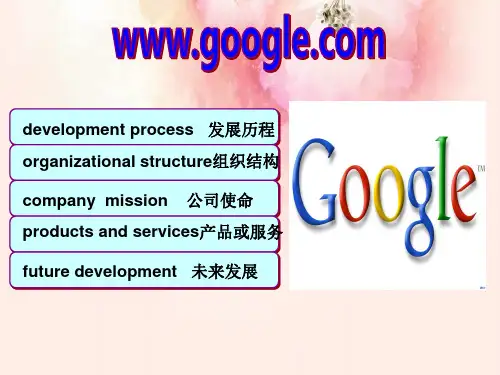
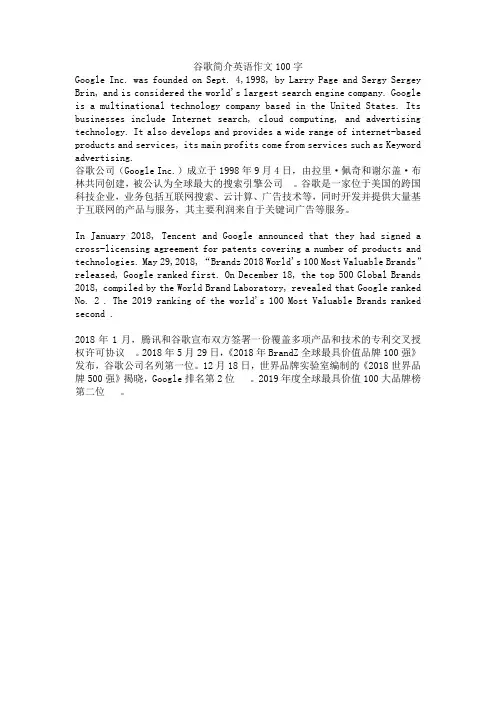
谷歌简介英语作文100字Google Inc. was founded on Sept. 4,1998, by Larry Page and Sergy Sergey Brin, and is considered the world's largest search engine company. Google is a multinational technology company based in the United States. Its businesses include Internet search, cloud computing, and advertising technology. It also develops and provides a wide range of internet-based products and services, its main profits come from services such as Keyword advertising.谷歌公司(Google Inc.)成立于1998年9月4日,由拉里·佩奇和谢尔盖·布林共同创建,被公认为全球最大的搜索引擎公司。
谷歌是一家位于美国的跨国科技企业,业务包括互联网搜索、云计算、广告技术等,同时开发并提供大量基于互联网的产品与服务,其主要利润来自于关键词广告等服务。
In January 2018, Tencent and Google announced that they had signed a cross-licensing agreement for patents covering a number of products and technologies. May 29,2018, “Brandz 2018 World's 100 Most Valuable Brands”released, Google ranked first. On December 18, the top 500 Global Brands 2018, compiled by the World Brand Laboratory, revealed that Google ranked No. 2 . The 2019 ranking of the world's 100 Most Valuable Brands ranked second .2018年1月,腾讯和谷歌宣布双方签署一份覆盖多项产品和技术的专利交叉授权许可协议。
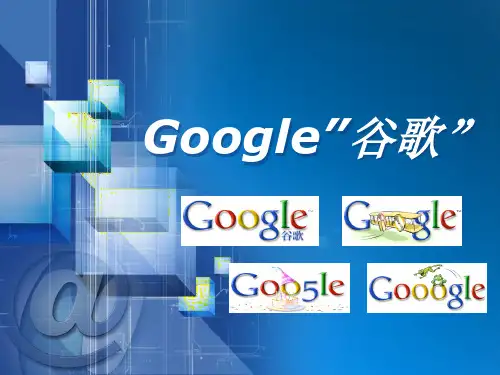
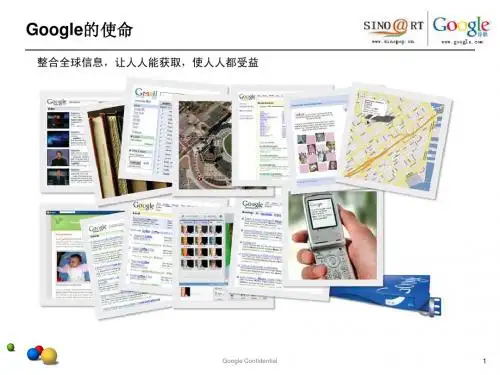
谷歌历史英文作文Google is a household name, known by people all over the world. It has revolutionized the way we search for information, connect with others, and access services online. The company's history is a fascinating journey of innovation and success.In the early days, Google was just a small startup founded by Larry Page and Sergey Brin. They had a vision to organize the world's information and make it universally accessible and useful. With their brilliant minds and determination, they created a search engine that quickly gained popularity for its accuracy and efficiency.As Google grew, it expanded its services beyond search. Gmail was introduced, offering users a free and efficient email platform. Google Maps revolutionized the way we navigate and explore the world. And who can forget about Google Translate, making communication across languages easier than ever before?One of Google's most significant achievements is the development of Android, an operating system that powers billions of smartphones worldwide. This move allowed Google to dominate the mobile market and become an integral part of people's lives.Google's commitment to innovation is evident in its constant pursuit of new technologies and ideas. The company has invested heavily in research and development, leading to breakthroughs like self-driving cars and Google Glass. These futuristic projects demonstrate Google's determination to push the boundaries of what is possible.Despite its immense success, Google has faced its fair share of controversies. Issues such as privacy concerns and accusations of monopolistic practices have put the company in the spotlight. However, Google has always strived to address these concerns and maintain the trust of its users.Today, Google continues to evolve and adapt to theever-changing digital landscape. It remains at theforefront of technological advancements, with projects like Google AI and Google Cloud pushing the boundaries of what technology can do. The company's influence is undeniable, and its impact on society will only continue to grow.In conclusion, Google's history is a testament to the power of innovation and determination. From a small startup to a global tech giant, Google has transformed the way we live and interact with the world around us. Its impact on the digital age is immeasurable, and it will undoubtedly shape the future of technology.。
谷歌的发展历史英文作文Google's Development HistoryGoogle, a multinational technology company specializingin Internet-related services and products, was founded in 1998 by Larry Page and Sergey Brin while they were Ph.D. students at Stanford University. The company's mission statement from the outset was "to organize the world's information and make it universally accessible and useful."In 1996, Larry Page and Sergey Brin began collaborating on a search engine called BackRub, which operated on Stanford servers for more than a year. The name was eventually changed to Google, a play on the word "googol,"a mathematical term for the number 1 followed by 100 zeros. The use of the term reflected their mission to organize a seemingly infinite amount of information on the web.In 1998, Google was officially incorporated with its initial public offering (IPO) taking place in 2004. The company has since grown to become one of the mostinfluential and successful technology companies in theworld, offering a wide range of products and services beyond its original search engine function.Google's development can be divided into several key stages, each of which has significantly contributed to the company's success and impact on the technology industry.Firstly, the company's core product, the Google search engine, revolutionized the way information is accessed and organized on the internet. By employing an algorithm that ranked web pages based on their relevance and authority, Google was able to provide users with more accurate and useful search results than any other search engine at the time.Secondly, Google's expansion into advertising with the introduction of AdWords and AdSense in 2000 and 2003 respectively, allowed the company to monetize its search engine and other online properties. This move not only generated significant revenue for Google but also provided a platform for businesses to reach potential customers in a targeted and cost-effective manner.Thirdly, Google's acquisition of YouTube in 2006 marked its entry into the online video space, which has sincebecome a dominant force in the digital entertainment industry. This acquisition not only expanded Google's reach to a new audience but also provided a platform for user-generated content and video advertising.Additionally, Google's development of the Android operating system and its acquisition of the mobile phone company, Motorola Mobility, in 2012, solidified itsposition in the mobile technology market. The Android operating system has become the most widely used mobile operating system in the world, powering billions of devices globally.Furthermore, Google's foray into hardware with the release of products such as the Google Pixel smartphone and Google Home smart speaker has positioned the company as a competitor in the consumer electronics market, challenging established players like Apple and Samsung.Google's commitment to innovation and research is evident in its investment in projects such as self-driving cars, artificial intelligence, and renewable energy. These initiatives demonstrate the company's ambition to push theboundaries of technology and its commitment to addressing global challenges.In recent years, Google has faced scrutiny and criticism regarding issues such as user privacy, antitrust concerns, and the impact of its algorithms on society. The company has taken steps to address these concerns throughinitiatives such as improved privacy controls, transparency in advertising practices, and ethical guidelines for the development of artificial intelligence.Despite these challenges, Google remains a dominant force in the technology industry and continues to shape the way people access and interact with information, entertainment, and technology. With its ongoing commitment to innovation and its vast resources, Google is poised to remain a leader in the technology industry for years to come.谷歌的发展历史谷歌是一家专门从事互联网相关服务和产品的跨国科技公司,由拉里·佩奇(Larry Page)和谢尔盖·布林(Sergey Brin)在斯坦福大学攻读博士学位时于1998年创立。
1g到5g的发展历程英语作文The first generation of mobile technology, known as 1G, emerged in the 1980s, revolutionizing communication byenabling voice calls through analog signals. It was a breakthrough, albeit with limited coverage and poor call quality.As we transitioned to the 2G era in the 1990s, the landscape of mobile communication transformed dramatically. Digital signals replaced analog, paving the way for SMS text messaging and basic data services, which significantly enhanced the way we interacted with our devices.The turn of the millennium brought forth 3G technology, a leap that introduced mobile internet access. This generation allowed for faster data transfer rates, enabling users to browse the web, send emails, and access multimedia content on the go.4G, or the fourth generation, arrived in the early 2010s, offering lightning-fast speeds and even greater connectivity. It was a game-changer for streaming services, online gaming, and the proliferation of mobile applications, truly usheringin the era of mobile internet as we know it today.Now, as we stand on the brink of the 5G revolution, the promise of near-instantaneous connectivity, ultra-low latency, and massive device connectivity is set to redefine ourdigital experience. From autonomous vehicles to smart cities, 5G is poised to be the backbone of the next wave of technological innovation.Throughout these generations, the evolution of mobile technology has been nothing short of astounding, reflecting the relentless pursuit of innovation and the ever-growing demand for seamless, high-speed communication.The journey from 1G to 5G is a testament to human ingenuity and the ceaseless drive to connect and empower people across the globe. As we embrace the possibilities of 5G, we look forward to a future where the boundaries of communication and technology continue to expand.。
Google的英文介绍Google的英文介绍A young man left hometown 22 years ago, and turned out to be a poor correspondent2. After a while his letters dried up3, and for six years the family had heard nothing from him. Then his sister entered his name in the Google search engine4 on the Web and, as she says, ” There he was on a bowling league5 in Brazil!” Now they’re exchanging catch-up letters and photos.6 Who knew Brazilian bowling leagues had Web sites? Google knew, because Google knows everything, or nearly.The name comes from “googol,” the mathematical term for a 1 followed by 100 zeros.7 This means, “a hell of a lot more than there is in the universe.”8 The Google people chose it because they want to organize all the data on the Web.Google started in 1998, when two 26-year-olds , Sergei Brin and Larry Page, set up shop in a tiny office. Today they operate out of a building in Mountain View, Calif., and regional offices all over the world. Google has become the best and most successful search engine.If you need a map of a region, Google will oblige9. If you rip the rotator cuff in your shoulder,10 Google finds drawings that show you how it works. Should you wish to remember an Alex Colville11 painting, you may well find it among the 181 Colville images available. If you want to recall Churchill’s photo, Banff, or Cary Grant,12 Google will show them to you, usually in dozens of versions.An epidemiologist or social psychologist studying reactions to a phenomenon like the West Nile virus might well come here often,13 to learn what people are saying about it.This section also provides a rich field for ego-surfing14, or entering your own name to find out what is said about you. Some consider ego-surfing neurotic, and anyone who does it every day probably suffers from an identity problem.15The other day, unable to resist, I found that I’ve been mentioned about 500 times in the various chat rooms that Google monitors. This provided half an hour of innocent pleasure.Google’s news report links to 4,500 news sources around the world. On the screen it looks rather like a newspaper page, with pictures and headings, but it changes constantly as newspapers and broadcasters change what they put on the Web.A story gets on if enough newspapers run it and give it prominence.16 Every minute, the computers the page and compile related stories while dropping others. No human editors decide what’s to be emphasized. It sounds ridiculous, but it’s not bad at all.However Google is boastful17. It can’t keep itself from telling you how inconceivably fast it is. Ask it for information on Chinese archaeology and it compiles 29,400 links, adding: “search took 0.14 seconds.”Another problem is that identical names baffle Google.18 It needs help distinguishing between Francis Bacon, the 20th-century painter, and Francis Bacon, the 17th-century philosopher. Sometimes Google looks a little foolish.Now that the verb “to Google” is embedded in the language,19 Googling has turned out to be, for some, a moral problem. A woman wrote to Randy Cohen, the New York Times ethicist, about a friend who had gone out with a doctor and then Googled him when she got home, discovering that he had been involved in several malpractice suits.20 Cohen was asked whetherthis was a decent21 thing to do. He said it was and that he had done it himself. The woman’s Googling, Cohen said, was benign22, just like asking her friends about this fellow.Tired of Google? I’m afraid those who are tired of Google are tired of life.。
While the primary business interest is in the web content arena, Google has begun experimenting with other markets, such as radio and print publications. On 17 January 2006, Google announced the purchase of a radio advertising company "dMarc", which provides an automated system that allows companies to advertise on the radio.This will allow Google to combine two niche advertising media—the Internet and radio—with Google's ability to laser-focus on the tastes of consumers. Google has also begun an experiment in selling advertisements from its advertisers in offline newspapers and magazines, with select advertisements in the Chicago
Sun-Times.They have been filling unsold space in the newspaper that would have normally been used for in-house advertisements. Acquisitions
Since 2001, Google has acquired several companies, mainly focusing on small start-ups.
In 2004, Google acquired a company called Keyhole, Inc.,which developed a product called Earth Viewer, renamed in 2005 to Google Earth.
In February 2006, software company Adaptive Path sold Measure Map, a weblog statistics application, to Google. Registration to the service has since been temporarily disabled. The last update
regarding the future of Measure Map was made on 6 April 2006 and outlined many of the known issues of the service.
In late 2006, Google bought the online video site YouTube for $1.65 billion in stock.Shortly after, on 31 October 2006, Google announced that it had also acquired JotSpot, a developer of wiki technology for collaborative Web sites.
On 13 April 2007, Google reached an agreement to acquire DoubleClick. Google agreed to buy the company for $3.1 billion. On 2 July 2007, Google purchased GrandCentral. Google agreed to buy the company for $50 million.
On 9 July 2007, Google announced that it had signed a definitive agreement to acquire enterprise messaging security and compliance company Postini.
On August 5 2009, Google announced the purchase of video software maker On2 Technologies for $106.5 million - its first acquisition of a public company.
On 24 November 2009, Google announced the purchase of Teracent, a California based start up company, for an undisclosed price. This is another acquisition on Google's behalf in a series of advertising related purchases- AdMob, Double Click.。